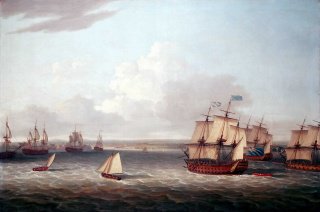 Spain sided with France against the United Kingdom in the Seven Year’s War. Britain declared war on Spain on January 4, 1762, and launched an Anglo-American expedition to capture Havana, the third largest city in the New World, and essential to Spanish transatlantic communications (and the supply of wealth from the Indies to Spain). On June 6, Lord Albemarle landed troops at Cojímar, while Sir George Pocock took the main fleet to Havana, which surrendered in mid-August, following a siege and a bloody assault on El Morro fort (gallantly defended by Luis de Velasco Isla). Britain failed to conquer the entire island and many Havana residents were able to flee into the interior with such goods as they could take with them. The city was returned to Spain in 1762, in exchange for Florida. The influence of the occupation on the city and on the development of the Cuban economy has long been regarded as decisive. For the first time, legal trade with all countries was allowed, including the ending of controls on the African salve trade, with increased importation and sale of slaves. Contraband ceased to be necessary. Cuban cigars became popular in England and in North America, stimulating tobacco production. Freemasonry and religious toleration were introduced. When the Spanish returned, they found it difficult to reestablish the old restrictions.
Spain sided with France against the United Kingdom in the Seven Year’s War. Britain declared war on Spain on January 4, 1762, and launched an Anglo-American expedition to capture Havana, the third largest city in the New World, and essential to Spanish transatlantic communications (and the supply of wealth from the Indies to Spain). On June 6, Lord Albemarle landed troops at Cojímar, while Sir George Pocock took the main fleet to Havana, which surrendered in mid-August, following a siege and a bloody assault on El Morro fort (gallantly defended by Luis de Velasco Isla). Britain failed to conquer the entire island and many Havana residents were able to flee into the interior with such goods as they could take with them. The city was returned to Spain in 1762, in exchange for Florida. The influence of the occupation on the city and on the development of the Cuban economy has long been regarded as decisive. For the first time, legal trade with all countries was allowed, including the ending of controls on the African salve trade, with increased importation and sale of slaves. Contraband ceased to be necessary. Cuban cigars became popular in England and in North America, stimulating tobacco production. Freemasonry and religious toleration were introduced. When the Spanish returned, they found it difficult to reestablish the old restrictions.

CHECK MATE ISRAEL?
* By Jaime Suchlicki As the smoke of Hamas’ unprovoked brutal attack against Israel on October 7 begins to dissipate, a new







